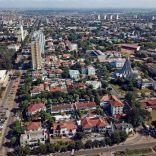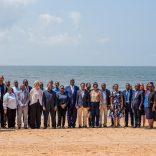Mozambique: Government holds public consultation on creation of the General Inspectorate of the ...
Private creditors do not want to worsen the crisis but face constraints – Thomas Lareya

File photo
International law and policy expert in sovereign debt restructuring and Africa-related finance Thomas Laryea said in an interview with Lusa today that private creditors “should avoid worsening” the debt situation of vulnerable countries, but warned of the constraints they face.
“The main objective for the private sector in this phase of crisis containment is to avoid exacerbating the situation,” he said.
Lusa asked Laryea to comment about the efforts of African countries to secure a moratorium on debt payments, allowing spending to be directed towards health care.
“In the context of the financial challenges of the poorest countries, this implies postponing debt service and inhibiting charging amounts or initiating legal action against a particular country, or even refraining from declaring financial default,” said the lawyer and former representative of private creditors in the sovereign debt restructuring carried out by Mozambique last year.
Regarding the response of private creditors to the G20 challenge to accept a suspension of debt payments from developing countries, Lareya admitted that “some say the private response is not such a big deal”, but explained that the group was not heterogeneous and was not always the ultimate debt holders either.
“The scale and type of financial action needed to contain the consequences of the Covid-19 pandemic requires a macro response, which only the government sector has the power to carry out, and the G20 initiative is explicitly subject to the application of national laws, which has very different implications, given that creditor countries have wide authority to exercise their prerogative to cancel or accept debt orders using any basis they want,” he explained.
Private individuals are subject to other constraints. “Private creditors, by contrast, may be subject to legal or regulatory obligations, such as fiduciary obligations and class action requirements, which act as a limitation on the circumstances in which they may suspend contractual financial terms,” he observed.
Asked whether creditors should agree on a global package or negotiate on a case-by-case basis with each of the countries requiring debt relief, Laryea stressed the “enormous effort” being made by the International Financial Institute (IFI, the official representative of private creditors worldwide) and noted that, “given the diversity of private sector creditors and their financing models and the laws by which they are governed, it is advisable not to prescribe the same model for all”.
The acknowledgment of the debt problem as a central issue for African governments was highlighted in the concern that the International Monetary Fund and the World Bank afforded the issue during the annual meetings in April, at which they made funds available and agreed a moratorium on payments by the most vulnerable countries.
On April 15, the G20 group of industrialised nations also agreed a suspension of US$20 billion of bilateral debt for the poorest countries, many of which are African, by the end of the year, challenging private creditors to join the initiative.
The International Financial Institute (IFI), which brings together creditors worldwide, announced last week its intention to participate in the G20 initiative that proposes to suspend payments to creditors between May and December, although without committing to the terms and without giving details, estimating that sovereign debt and interest on loans taken out by developing countries and poorest countries due to be paid this year would stand at around US$140 billion (€127.8 billion).
In addition, the African Union and the United Nations Economic Commission for Africa (UNECA), among other institutions, are designing a plan that aims to exchange countries’ sovereign debt for new concessional bonds so as to prevent funds needed to combat the Covid -19 being used to pay creditors.
This mechanism would be guaranteed by a multilateral bank with a triple A credit rating or a central bank, which would convert the current debt into securities with a longer maturity, benefiting from five years of payment and coupon exemption.
Another possibility, put forward by the Special Representative of the African Union for the response to the pandemic, Ngozi Okonjo-Iweala, is that this ‘Special Purpose Vehicle’ could be financed by the Special Drawing Rights that the wealthiest nations have in the International Monetary Fund, and which make up the Fund’s reserves.
On Sunday, the African Union’s acting president, South Africa’s Cyril Ramaphosa, argued that the moratorium on debt payments should extend for two years, not just until the end of the year, as the G20 has proposed.












Leave a Reply
Be the First to Comment!
You must be logged in to post a comment.
You must be logged in to post a comment.